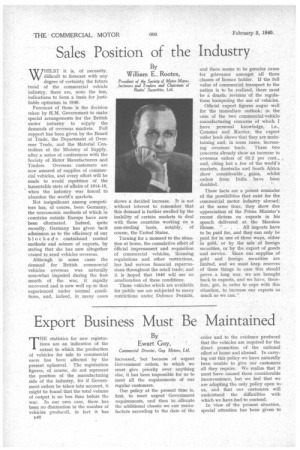Sales Position of the Industry
Page 66

If you've noticed an error in this article please click here to report it so we can fix it.
By William E. Rootes,
HILST it is, of necessity, difficult to forecast with any degree of certainty the future trend of the commercial vehicle industry, there are, none the less, indications to form a basis for justifiable optimism in 1940.
Foremost of these is the decision taken by H.M. Government to make special arrangements for the British motor industry to supply the demands of overseas markets. Full support has been given by the Board of Trade, the Department of Overseas Trade, and the Material Controllers of the Ministry of Supply, after a series of conferences with the Society of Motor Manufacturers and Traders. Overseas customers are now assured of supplies of commercial vehicles, and every effort will be made to avoid repetition of the lamentable state of affairs of 1914-18, when the industry was forced to abandon the world's markets.
Not insignificant among competitors has, of course, been Germany, the uneconomic methods of which in countries outside Europe have now been eliminated. Indeed, quite recently, Germany has given tacit admission as to the efficiency of our bl oek a d e contraband control methods and • seizure of exports, by stating that she has now altogether ceased to send vehicles overseas.
Although in some cases the demand for British commercial vehicles overseas was naturally somewhat impeded during the first month of the war, it rapidly recovered and is now well up to that experienced under normal conditions, and, indeed, in many cases shows a decided increase. It is not without interest to remember that this demand is further swelled by the inability of certain markets to deal with those countries working on a non-sterling basis, notably, of course, the United States.
Turning for a moment to the situation at home, the cumulative effect of Official impressment and requisition of commercial vehicles, licensing regulations and other restrictions, has had serious financial repercussions throughout the retail trade; and it is hoped that 1940 will see an amelioration of these conditions.
Those vehicles which are available for public use are subjected to many restrictions under Defence Permits, and there seems to be genuine cause for grievance amongst all three classes of licence holder. If the full value of commercial transport to the nation is to be realized, there must be a drastic revision of the regulations hampering the use of vehicles.
Official export figures augur well for the immediate outlook; in the case of the two commercial-vehicle manufacturing concerns of which I have personal knowledge, i.e.. Commer and Karrier, the export order book shows that they are maintaining and, in some cases, increasing overseas trade. These two concerns already show an increase in overseas orders of 63.2 per cent., and, citing but a few of the world's markets, Australia and South Africa show considerable , gains, whilst orders from India have been doubled.
These facts are a potent reminder of the possibilities that exist for the commercial motor industry abroad; at the same time, they show due appreciation of the Prime Minister's recent dictum on exports in his speech delivered at the Mansion House. " . . . All imports have to be paid for, and they can only be paid for in one of three ways, either in gold, or by the sale of foreign securities, or by the export of goods and service. Since our supplies of gold and foreign securities are limited, and we must keep reserves of these things in case this should prove a long war, we are brought back to exports, and we have, therefore, got, in order to cope with this situation, to increase our exports as much as we can."








































































































